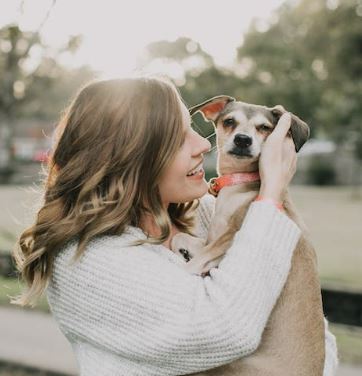Today, we’re diving into the enigmatic world of dog dreams, exploring what our furry friends might be experiencing while they snooze. Are they chasing squirrels, reliving their favorite memories, or solving complex canine mysteries? Let’s find out!
Do Dogs Dream?
Research suggests that, just like humans, dogs do indeed dream. A dog’s sleep cycle is similar to ours, consisting of various stages, including rapid eye movement (REM) sleep. It is during REM sleep that dreams typically occur for both humans and dogs. Furthermore, brainwave patterns in dogs during REM sleep are strikingly similar to those of humans, indicating the presence of dreams.
What Do Dogs Dream About?
Although we can’t say for certain what dogs dream about, experts believe that their dreams are likely related to their daily experiences. Much like humans, dogs may process and consolidate memories during sleep, which could result in dreams that reflect their waking lives.
For example, a dog that spends their day chasing squirrels in the park may dream about similar pursuits, while a service dog may dream about their work with their human handler. Of course, the content of a dog’s dream can be as varied and unique as the dog itself.
Doggy Dream Behavior: What to Look For
While we can’t dive into our pup’s mind to view their dreams directly, we can observe physical signs that suggest they’re in the midst of a dream. Here are some behaviors to look out for:
- Twitching: As your dog drifts into REM sleep, you might notice their legs or facial muscles twitching. This could indicate that they’re acting out their dream, whether it’s running through a field or nibbling on a tasty treat.
- Whimpering or barking: Soft whimpers or even barks during sleep might be a sign that your dog is experiencing an emotional dream. However, the meaning behind these vocalizations can be as varied as the content of the dream itself.
- Rapid eye movement: During REM sleep, your dog’s eyes may move rapidly beneath their closed eyelids, following the events of their dream.
- Breathing changes: Your dog’s breathing may become faster or more irregular during REM sleep, reflecting the excitement or intensity of their dream.
Should You Wake a Dreaming Dog?
It’s generally best to let sleeping dogs lie. Waking your dog suddenly during a dream can cause confusion and disorientation, potentially leading to fear or even aggression. However, if your dog appears to be experiencing a nightmare and is becoming increasingly distressed, you can gently rouse them by calling their name softly or stroking them gently.
Once they’re awake, offer some comfort and reassurance before allowing them to settle back into sleep.
The Benefits of Dreaming for Dogs
Dreaming is believed to have several benefits for dogs, much like it does for humans. These benefits include:
- Memory consolidation: Dreaming may help dogs process and store memories more effectively, improving their ability to learn and adapt to new experiences.
- Emotional regulation: Dreams can provide dogs with a safe space to work through their emotions, helping them maintain emotional balance and well-being.
- Mental stimulation: Just as daytime play and exploration keep your dog mentally engaged, dreaming can provide similar stimulation during sleep, ensuring that their minds remain active and healthy.
The Future of Dog Dream Research
As our understanding of canine cognition and sleep continues to grow, researchers are hopeful that we’ll eventually unlock more secrets about the mysterious world of dog dreams. Future studies may provide insights into the function and content of canine dreams, as well as the potential benefits they hold for our furry friends.
For instance, as technology advances, researchers may develop new methods for analyzing brain activity in dogs during sleep, providing a more detailed look at the dreaming process. Additionally, studying dog dreams could offer valuable insights into canine psychology, enhancing our understanding of how dogs perceive and process their experiences.
While the content of our dogs’ dreams remains a mystery, it’s clear that these nighttime escapades play a crucial role in their overall well-being. By understanding the importance of dreaming and recognizing the signs of a dreaming dog, we can ensure that our canine companions have the opportunity to explore their inner worlds in peace.

Marissa Delotta, 36, from Dayton, Ohio, is the creative force behind Roverboard.com, a beloved online destination for dog lovers. As a dedicated mom and canine enthusiast, Marissa combines her family experiences with her love for dogs to offer a platform where dog owners can exchange tips, heartwarming stories, and advice. Her website has become a vibrant community for sharing the joys of dog parenting. In her free time, Marissa enjoys exploring dog parks with her family and volunteering at local animal shelters.

